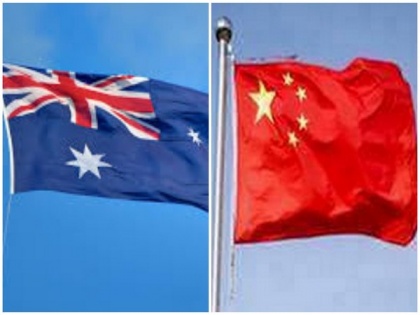Australia winning trade war with China despite Chinese restrictions
By ANI | Published: May 15, 2021 09:45 PM2021-05-15T21:45:41+5:302021-05-15T21:55:02+5:30
Though China has imposed punitive trade restrictions on Australian coal, barley, meat and wine, it is spending more than ever on Australian imports.

Australia winning trade war with China despite Chinese restrictions
Though China has imposed punitive trade restrictions on Australian coal, barley, meat and wine, it is spending more than ever on Australian imports.
Helen Clark, writing in Asia Times said that those who worry about Beijing's resultant leverage over Australia may feel vindicated after the travails of 2020 and 2021. The trade war rooted in geopolitics hasn't hurt the Australian economy or its crucial commodity exports, she said.
Indeed, China is spending more than ever on imports from Australia, given its reliance on iron ore and liquefied natural gas (LNG), two commodities commanding ever-higher prices on global markets and for which Australia is the world's largest exporter.
So far China has hit Australian coal, barley, meat, lobsters and wine with punitive trade measures, a tit for tat response to Australia's call for an independent investigation into the origins of the Covid-19 pandemic that by all credible accounts started in Wuhan, China, reported Asia Times.
Meanwhile, Australia's AD 1 billion wine export industry reported a 96 per cent drop in exports in the first quarter of 2021 after Chinese anti-dumping sanctions hit profits in the fourth quarter of 2020.
After the recent announcement of an "indefinite" halt of the China-Australia Strategic Economic Dialogue, China is now apparently moving beyond beef and booze to target Australian LNG exports.
But Australian deliveries to China have actually been growing this year with 29 cargoes in February, 37 in March and 43 in April. Based on tracking data, the 43 cargoes delivered from Australia to China in April were just short of a record, Adelaide consultancy EnergyQuest said in its April monthly LNG and gas report released on May 14.
Commodities commentators, meanwhile, say a Chinese move against LNG imports from Australia would mark a major escalation in their trade war. Australia is China's single largest supplier of LNG; China and Japan vary month to month as the largest importer of the fuel.
To be sure, Australian coal has taken a hit. Australian cargoes have not been allowed into China - the world's biggest importer - for close to a year, prompting calls for a reasoned diplomatic resolution, said Clark.
The coal dispute that began years ago under Prime Ministers Tony Abbott and Malcolm Turnbull has festered since under Scott Morrison through a series of go-nowhere resets.
Commodities commentator Clyde Russell says China's coal imports were down by 20.5 per cent in April over the prior month and fell almost 30 per cent over a year ago. China is paying twice as much for Russian coal of the same caloric value as that produced in New South Wales. China is also taking more coal of a lesser grade from Indonesia.
Meanwhile, Australian coal producers are starting to pivot to other markets, including India, the world's second-largest importer. India's imports of Australian coal hit a record high of 6.75 million tonnes in January, before the country's Covid catastrophe took hold.
Australia's thermal coal exports to India were 1.87 million tonnes in December 2020, up 450 per cent from 340,000 tonnes in December 2019, according to data from commodity price reporting agency Argus.
Further, Australia has Free Trade Agreements (FTAs) with major Asian economies Singapore (2003), Thailand (2005), Malaysia (2013) Korea (2014), Japan (2015) Indonesia (2019) and Hong Kong (2020). It is now working towards one with India, reported Asia Times.
Australia and China signed their free trade agreement, the ChAFTA, in December 2015 after years of protracted negotiations.
For Australia, it was predicated on the evergreen promise of access to China's growing middle class and, outside of bulk commodities, higher-end shipments like wine and eventually services.
Fast forward to the present, it's not working out that way. China has already warned its students may not return to Australia, threatening to withhold its single largest source of full tuition-paying foreign students, wrote Clark.
Current Defense Minister Peter Dutton recently promised to look over all states' agreements with China, including the highly controversial Port of Darwin 99-year lease held by Chinese company Landbridge Group.
Cancellation of the contract, EnergyQuest has suggested, could force China into a tit-for-tat in LNG contracts, wrote Clark.
Canberra has already nixed a 2018 agreement Victoria made with China to participate in the Belt and Road Initiative, while the latest sally is that China-funded Confucius Institutes may face closure under a new veto bill.
( With inputs from ANI )
Disclaimer: This post has been auto-published from an agency feed without any modifications to the text and has not been reviewed by an editor
Open in app